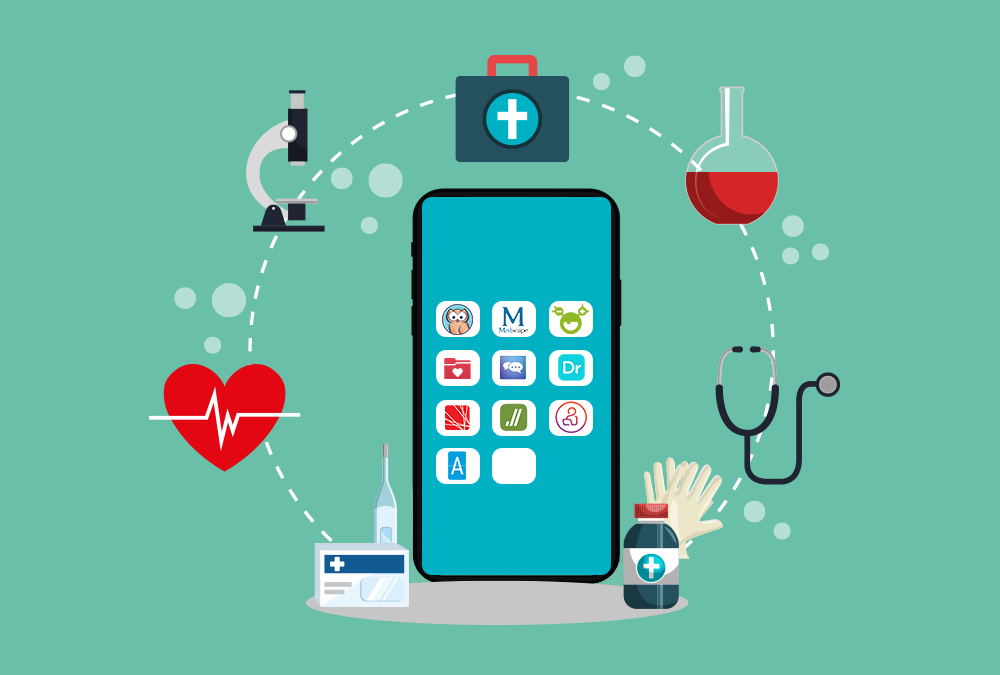Digital health apps are revolutionizing the way healthcare technology is delivered, offering personalized health solutions right at our fingertips. These apps utilize advanced algorithms, including reinforcement learning, to provide tailored support for patients, especially those dealing with chronic conditions like cancer. With the rise of cancer care apps and patient engagement apps, users can experience a more interactive and supportive health management journey. Unlike traditional one-size-fits-all approaches, digital health apps are designed to learn from individual interactions, optimizing their responses and interventions over time. This innovative approach not only enhances medication adherence but also fosters a deeper connection between patients and their care teams.
In the evolving landscape of healthcare, mobile medical applications are making waves as indispensable tools for managing personal wellness. Often referred to as health-related software or eHealth tools, these applications leverage cutting-edge technology to deliver customized health insights and enhance patient experiences. From innovative tools aimed at cancer support to robust platforms for improving patient engagement, the potential of these digital solutions is immense. With the integration of artificial intelligence and machine learning principles, these apps can adapt to users’ changing needs in real-time. By fostering a more engaged and informed patient community, digital health solutions are setting a new standard in healthcare delivery.
The Role of Digital Health Apps in Personalized Patient Care
Digital health apps have undoubtedly transformed the landscape of healthcare technology, offering tailored solutions for various patient needs. In the context of cancer care, these apps are utilizing sophisticated algorithms to provide personalized support, catering to the unique challenges faced by patients. For instance, adaptive algorithms can track a patient’s progress and adjust interventions in real time, ensuring that medications and lifestyle recommendations are always relevant and actionable. This level of personalization is essential, particularly for patients undergoing challenging treatments like stem cell transplants, where adherence to medication is critical.
Moreover, by leveraging data analytics and reinforcement learning, digital health apps not only function as reminders but also engage patients more effectively. They can offer psychological rewards for sticking to treatment protocols, enhancing motivation and compliance. In such a dynamic healthcare environment, the integration of technology with personalized health strategies represents a crucial advancement towards improving patient outcomes.
Leveraging Algorithms for Enhanced Patient Engagement
The development of apps employing reinforcement learning algorithms marks a significant shift in patient engagement strategies. These intelligent systems learn from user interactions, honing their ability to predict and react to the needs of patients. For example, rather than generic notifications about medication times, these apps can tailor messages based on prior adherence patterns, personalizing the user experience to enhance compliance. This is particularly beneficial for young adults who may be reluctant to adhere to traditional treatment plans, as the personalized approach can make healthcare feel less mechanical and more supportive.
By allowing for adjustments based on real-time data, these technologies also cultivate a sense of ownership in patients regarding their health journey. For instance, the ADAPTS HCT trial seeks to enhance caregiver-patient relationships through integrated digital solutions, ensuring that both parties receive motivation and reminders suited to their interactions. This synergy between patients and caregivers can lead to better management of treatment regimens, ultimately improving health outcomes and reinforcing the value of personalized support.
Innovations in Cancer Care Apps and Their Impact
Cancer care apps are at the forefront of blending technology with patient-centered care, significantly impacting the way patients manage their treatment journeys. These applications are designed not just to remind patients about their medication schedules but to engage them in a way that considers their emotional and physical challenges. By utilizing technology such as real-time feedback and tailored communications, these cancer apps foster a supportive environment that can reduce feelings of isolation common among patients.
Furthermore, as the Murphy lab explores additional factors like social support through gamified interactions, the significance of community in cancer care becomes apparent. By linking patients with their caregivers and even peers going through similar experiences, these apps enhance the healing process, proving that digital health solutions can indeed serve as vital components of comprehensive cancer care.
Reinforcement Learning: Revolutionizing Treatment Adherence
Reinforcement learning is paving the way for next-generation healthcare technologies aimed at improving treatment adherence among patients. By continuously learning from interactions and adapting their responses, these algorithms offer healthcare providers powerful tools to keep patients engaged and committed to their treatment plans. Specifically, for patients managing complex conditions, such as following a rigorous medication regimen post-transplant, these AI-driven apps provide timely reminders and support, crucial for their recovery journey.
This innovative approach transcends traditional methods of patient education, as reinforcement learning considers individual circumstances and emotional states, customizing interventions accordingly. The shift from static reminders to adaptive, context-aware support systems represents a significant leap forward in personalizing health strategies, which is essential for enhancing patient adherence and ultimately improving overall health outcomes.
The Importance of User-Centric Design in Healthcare Apps
User-centric design in digital health apps is essential to create tools that are not just functional but also resonate with the needs of patients. This approach focuses on understanding the user experience, ensuring that apps like those developed by Murphy’s lab are intuitive and meet the specific requirements of patients, especially those navigating the complexities of cancer treatment. By prioritizing user feedback during the development phase, these apps can maximize engagement and effectiveness.
Additionally, a well-designed user interface can significantly impact how patients interact with the application. For example, features that allow patients to customize notifications or facilitate easy communication with caregivers can lead to higher engagement levels. This emphasis on user experience is fundamental in fostering trust and reliance on digital health apps, thereby encouraging patients to take an active role in their health management.
Future Trends in Healthcare Technology and App Development
The future of healthcare technology is undoubtedly intertwined with the advancements in app development, particularly in the context of personalized health solutions. As artificial intelligence continues to evolve, we can expect more sophisticated applications that integrate seamlessly into patients’ everyday lives. These innovations will likely include enhanced features that provide predictive analytics for potential health risks, allowing for preemptive measures rather than reactive treatments.
Moreover, as healthcare systems begin to recognize the importance of holistic approaches to patient care, the demand for comprehensive digital health solutions will only increase. This will lead to further partnerships among tech developers, healthcare providers, and researchers to create apps that are not only effective but also affordable and accessible, ensuring that personalized health solutions reach a broader audience.
Enhancing Communication Between Patients and Caregivers
Effective communication between patients and caregivers is critical for successful treatment outcomes, particularly for those undergoing complex therapies like cancer care. Digital health apps can play a transformative role in facilitating this communication, providing platforms for sharing real-time updates on patient status, medication adherence, and emotional well-being. By fostering clear lines of communication, these apps help bridge the gap between patients and their support networks.
Furthermore, apps that include features such as feedback systems and shared logs can encourage ongoing dialogue, empowering caregivers to be more informed and proactive in their roles. This collaborative effort not only enhances the emotional support patients receive but also strengthens the treatment adherence process, as caregivers are equipped with the necessary insights to encourage their loved ones effectively.
The Role of Behavioral Science in App Development
Behavioral science principles play a crucial role in the development of effective health apps. Understanding human behavior allows developers to create features that effectively promote engagement and adherence to treatment protocols. By integrating behavioral insights, such as motivation and habit formation techniques, apps can enhance their impact on patient outcomes, particularly in areas like medication adherence and lifestyle changes.
Additionally, the inclusion of behavioral science in app algorithms can lead to the development of nudges—subtle prompts that encourage users to make healthier choices without overt pressure. This approach maximizes the potential for behavior change by making the desired actions easier to carry out, resulting in improved health metrics and empowering users on their health journeys.
The Challenges of Integrating Technology in Healthcare
Despite the myriad of benefits offered by digital health apps, the integration of technology into healthcare is met with several challenges. Issues surrounding data privacy, security, and compliance with healthcare regulations necessitate a careful approach to app development. As these applications gather sensitive health information, safeguarding this data becomes paramount to maintain patient trust and adhere to strict regulatory standards.
Moreover, the reliability and accuracy of the algorithms used in these apps can be a point of contention. Ensuring that the technology not only functions correctly but is also validated through clinical trials is essential before deploying them in real-world settings. Addressing these challenges will be crucial in achieving widespread acceptance of digital health solutions in the healthcare industry.
Frequently Asked Questions
What are digital health apps and how do they improve personalized health?
Digital health apps are mobile applications designed to enhance healthcare delivery by utilizing technology. They provide personalized health management tools that adapt to individual user needs, leveraging algorithms to offer customized support, reminders, and health information. This tailored approach improves patient engagement and encourages adherence to treatment regimens.
How do reinforcement learning algorithms enhance the effectiveness of cancer care apps?
Reinforcement learning algorithms power cancer care apps by continuously adapting their functionality based on user interactions. This means that the app learns from past behaviors to provide timely reminders and motivational messages tailored to each patient’s unique situation, thereby improving medication adherence and overall health outcomes.
In what ways do patient engagement apps support cancer patients?
Patient engagement apps specifically designed for cancer patients offer features like medication reminders, emotional support, and educational resources. By utilizing advanced algorithms, these apps can deliver personalized interventions at critical moments, helping patients manage their treatment and communicate effectively with caregivers.
What role does healthcare technology play in developing apps for stem cell transplant patients?
Healthcare technology plays a crucial role in developing apps for stem cell transplant patients by integrating advanced algorithms that facilitate real-time personalization and adaptive interventions. These technologies help to ensure that patients receive support tailored to their evolving health needs during their recovery process.
How do cannabis use apps utilize algorithms for user support?
Cannabis use apps utilize algorithms to track user behaviors and preferences, adapting their recommendations and support based on real-time data. By employing reinforcement learning, these apps can personalize interventions to help users reduce consumption and maintain healthier habits through timely reminders and motivational prompts.
What are the advantages of just-in-time adaptive interventions in digital health apps?
Just-in-time adaptive interventions ensure that users receive support exactly when they need it. In digital health apps, this approach heightens the relevance of reminders and interventions, leading to better adherence to health protocols and improved user engagement. The adaptive nature of these interventions allows apps to adjust to changing user circumstances, thereby enhancing therapeutic outcomes.
How can digital health apps improve communication between cancer patients and their caregivers?
Digital health apps can improve communication between cancer patients and their caregivers by providing a platform for sharing health updates, medication schedules, and emotional support. Features like messaging systems and collaborative tools foster a collaborative relationship, ensuring that caregivers can assist patients more effectively during their treatment journeys.
| Feature | Description |
|---|---|
| Target Audience | Cancer patients, cannabis users, and others needing support |
| Technology Used | Reinforcement learning algorithms and AI |
| Main Application | Helps patients adhere to medication, manage health, and improve caregiver relationships |
| Adaptive Features | Offers real-time personalization and just-in-time adaptive intervention |
| Example Projects | ADAPTS HCT for stem-cell transplant patients, MiWaves for cannabis users, Oralytics for oral hygiene |
Summary
Digital health apps are revolutionizing the way patients manage their health by providing tailored support through sophisticated algorithms. These innovations empower users to adhere to treatment protocols, enhancing recovery during challenging times like cancer treatment. By leveraging real-time data and personalized interactions, digital health apps improve the relationship between patients and caregivers, facilitating better health outcomes.



